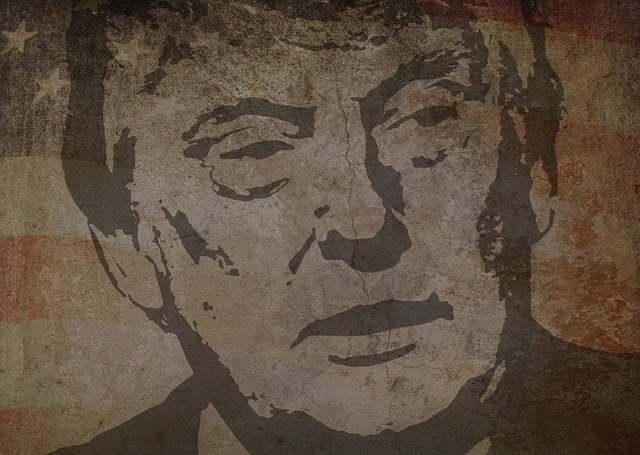
Biden DOJ Crossed Political Rubicon With Trump Indictment
This essay was co-authored with John Yoo and originally published on June 12, 2023 at Bloomberg Law. Yoo is a law professor at the University of California, Berkeley, a nonresident senior fellow at the American Enterprise Institute, and visiting fellow at the Hoover Institution.
UC Berkeley School of Law’s John Yoo and the Claremont Center’s Robert Delahunty warn the indictment of former President Donald Trump looks like selective prosecution and could further erode public trust in government institutions.
The Biden administration crossed a constitutional Rubicon this week. For the first time in our history, federal prosecutors have charged a former president. Also for the first time in our history, an executive branch held by the incumbent political party indicted the leading presidential candidate of the other main political party. President Joseph Biden has taken a fateful step about which even Richard Nixon did not dare to dream.
On Friday, DOJ special counsel Jack Smith unveiled a 49-page indictment against Donald Trump. Its 38 counts covered seven criminal charges, including willful retention of national defense information, corruptly concealing documents, conspiring to obstruct justice, and making false statements to federal officials.
Biden administration officials must explain why prosecuting Trump for misuse of classified documents justifies disregarding two centuries of constitutional practice. Presidents remain subject to the law just as anyone else. But our system has long understood that the Justice Department—which assists the president in his duty to “take Care that the Laws be faithfully executed”—can’t prosecute every person for every violation of every federal law.
Prosecutors must exercise discretion to choose the most important cases to bring; the critical factor is whether a prosecution serves the public interest. Even after the Civil War, the federal government didn’t make Confederate President Jefferson Davis stand trial.
We can agree there are cases where former presidents should undergo investigation and prosecution. In the Federalist Papers, Alexander Hamilton argued that presidents could undergo prosecution after their conviction in a Senate trial of impeachment for treason, bribery, or other high crimes and misdemeanors.
“After having been sentenced to a perpetual ostracism from the esteem and confidence, and honours and emoluments of his country,” the founding’s foremost defender of presidential power wrote, “he will still be liable to prosecution and punishment in the ordinary course of law.”
But even if a jury convicts Trump, none of the crimes of which he is accused rises to the level of impeachable conduct.
There are good reasons for prosecuting someone who has taken classified information, such as ending the risk of disclosure or deterring future lawbreakers. But history has recognized weightier reasons for leaving former presidents alone. We don’t want the prospect of criminal investigations to distort the thinking of future presidents and interfere with the energy in the executive so necessary for their success.
Our current political situation should raise the bar for prosecuting a former president even higher. Multiple events have increased popular distrust of law enforcement, which depends on public belief in its integrity for success.
Law enforcement and national security leaders have already tried once to prevent Trump’s election and cripple his presidency. In 2016, the Hillary Clinton campaign fabricated false reports of “collusion” between Trump and Russia and spread them to a sympathetic law enforcement and national security bureaucracy.
The “Russia hoax” sparked a special counsel investigation that paralyzed the Trump White House for two years. The recent Durham Report fingered political bias by high FBI officials as the culprit.
More stories of law enforcement bias have followed. Members of Congress are accusing the FBI of blocking investigation into potential corruption by the Biden family. The FBI apparently even worked with social media before the 2020 election to suppress the New York Post’s reporting on Hunter Biden’s laptop.
In this context, the Trump indictment will appear to many to be a case of selective prosecution. The DOJ hasn’t prosecuted either Biden or Mike Pence for keeping classified documents after their terms as vice president. Perhaps these cases didn’t involve obstruction or false statements.
But there seems little to distinguish Hillary Clinton’s case. She installed a secret, home-brewed computer network to handle her emails—many of which contained sensitive or classified information—and then her staff destroyed thousands of those messages before allowing government investigators access.
Trump will not prove his innocence in the courtroom by arguing that Hillary is guilty too. But the difference in their treatment will further undermine the DOJ’s reputation.
The strength of the Trump indictment lies not in the national security claims but in the “process” charges. Even if Trump were ultimately found not guilty of the classified document charges, he may nonetheless have illegally obstructed and lied to FBI agents during the course of the investigation.
On the other hand, Trump might transform his worst vulnerability into his greatest strength. The FBI seems to have gathered its most compelling evidence from Trump’s own lawyers. Trump can appeal this violation of his attorney-client privilege as well as the waiver of his executive privilege by Biden.
Even if Trump is eventually convicted, the Biden administration will have destroyed one more constraint on partisan politics and further damaged the public’s respect for law enforcement. Will pursuing Trump be worth yet more permanent damage to our institutions? We will find out in the trial and election to come.
This article does not necessarily reflect the opinion of Bloomberg Industry Group, Inc., the publisher of Bloomberg Law and Bloomberg Tax, or its owners.

 Twitter
Twitter
 Facebook
Facebook